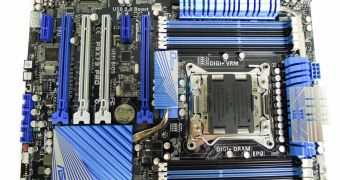ASUS definitely wants to have the whole motherboard market segment covered when Intel launches its Sandy Bridge-E CPUs, so it prepared several motherboards, one of which is the P0X79 Pro.
The P9X79 Pro mainboard is a big ATX beast whose PCB (printed circuit board) is laced with high-quality components.
The more or less obvious goal is for there to be a high reliability and stability, so as to withstand the pressure that high-end Intel chips could exert even at computing higher settings that stock ones.
On that note, the product also has all the ports and slots it needs to allow the CPU to let loose.
The eight DDR3 memory slots are the most obvious of these features, followed closely by the four PCI Express x16 slots.
Since enthusiasts usually don't mind spending some extra cash on graphics adapters, this will help with setting up hardcore multi-GPU configurations.
In addition to the four x16 slots, ASUS threw in a pair of low-profile PCI Express x1 slots as well, for sound cards or USB hub adapters, etc.
Then again, there will probably be no need for any such AIBs (add-in boards) to be bought, considering that the mainboard itself already incorporates that functionality.
The I/O Panel, in addition to Gigabit LAN, offers four USB 3.0 connectors, audio jacks (from Realtek ALC898 controller) and two Power eSATA ports.
Furthermore, the company paid special mind to the overclocking aspect, implementing a BIOS reset button and the possibility to upgrade said BIOS from a USB flash drive without actually starting the PC.
Other specifications include four of SATA 6.0 Gbps ports (two are handled by a third-party controller), just as many SATA 3.0 Gbps connectors and support for virtually 'merging' a hard disk drive (HDD) with a solid state drive (SSD) via SSD caching.
Finally, the newcomer has UEFI BIOS, TPU and EPU technologies and a Digi+ VRM 8+2+2+2 Power Phase Design. Pricing and availability are still unknown, unfortunately, like they are for the near look-alike ASUS P9X79 Deluxe.

 14 DAY TRIAL //
14 DAY TRIAL //